 Another SXSW Film Festival has come and gone, but here I am, still chillin’ in Austin. Why is that? Oh yeah, it’s because I live here now??? In sharp contrast to my pre-fest assumption that all would be smoother and groovier since I’d be in Austin long before the tornado blew into town, my mid-fest realization proved to be quite the opposite. But lest you think I’m here to blame the powers-that-be at SXSW, no such luck. Having to deal with the simultaneous stresses of buying a house and trying to picture lock a feature were the primary havoc wreakers in my life (note to self: next year, try not to do that).
Another SXSW Film Festival has come and gone, but here I am, still chillin’ in Austin. Why is that? Oh yeah, it’s because I live here now??? In sharp contrast to my pre-fest assumption that all would be smoother and groovier since I’d be in Austin long before the tornado blew into town, my mid-fest realization proved to be quite the opposite. But lest you think I’m here to blame the powers-that-be at SXSW, no such luck. Having to deal with the simultaneous stresses of buying a house and trying to picture lock a feature were the primary havoc wreakers in my life (note to self: next year, try not to do that).
As for the festival itself, I confess that it was difficult to suppress my rising feeling that Sundance’s expansion—and top-notch curation—of this year’s NEXT Section stole a little bit of SXSW’s world premiere thunder. Though I apparently wasn’t the only one who felt this way, that’s neither here nor there, really. There was still much goodness to behold. Beyond that, the realization that so many of the strongest Sundance premieres had deep roots in the Austin/Texas film scene ensured that Janet Pierson, Jarod Neece, and the SXSW team would justifiably fill most of their limited “Festival Favorites” slots with these titles. If one were looking to encapsulate the (thriving) state of American cinema in early 2013, it would be hard to top this seven-film list: Before Midnight, Mud, Computer Chess, Prince Avalanche, A Teacher, Pit Stop, Upstream Color.
Okay, let’s get to it, as there are lots of words contained within this post.
FILMS WATCHED AND DUG THE VERY MOST
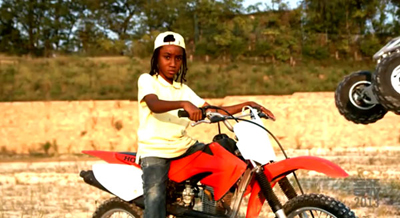 12 O’Clock Boys (Lotfy Nathan, 75m) — If only more first features were like this: imperfect, to be sure, but filled with incredible access and countless moments of raw power. For those of us still suffering through The Wire withdrawal, Lotfy Nathan’s portrait of Baltimore adolescent Pug and his three-year chronicling of Pug’s obsession with that city’s biker culture is a satisfying fix. Nathan opens his film with local news reports mixed with breathtaking super-slow-mo footage of these bikers in action, yet neither of these choices, nor the film’s swift pace, turn this into a display of style-over-substance. It might seem extreme, but in a dangerous environment such as inner city Baltimore, hopping on a motorbike and wheelie-ing recklessly through the streets provides the safest, most thrilling escape.
12 O’Clock Boys (Lotfy Nathan, 75m) — If only more first features were like this: imperfect, to be sure, but filled with incredible access and countless moments of raw power. For those of us still suffering through The Wire withdrawal, Lotfy Nathan’s portrait of Baltimore adolescent Pug and his three-year chronicling of Pug’s obsession with that city’s biker culture is a satisfying fix. Nathan opens his film with local news reports mixed with breathtaking super-slow-mo footage of these bikers in action, yet neither of these choices, nor the film’s swift pace, turn this into a display of style-over-substance. It might seem extreme, but in a dangerous environment such as inner city Baltimore, hopping on a motorbike and wheelie-ing recklessly through the streets provides the safest, most thrilling escape.
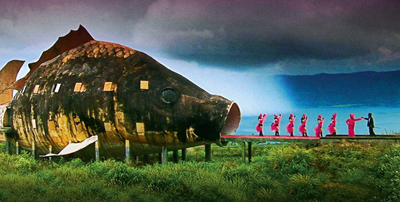 The Act of Killing (Joshua Oppenheimer, 116m) — Having heard resoundingly hyperbolic praise for this film for the past many months, it was hard not to go into it with some skepticism. But from the very first moments, I understood that everybody is right: there really isn’t much else one can compare this to. A multi-multi-layered exploration of guilt, murder, and how we hide behind that artifice of fiction, The Act of Killing is an at times physically overwhelming experience. You have been warned, and you have been ordered to see it.
The Act of Killing (Joshua Oppenheimer, 116m) — Having heard resoundingly hyperbolic praise for this film for the past many months, it was hard not to go into it with some skepticism. But from the very first moments, I understood that everybody is right: there really isn’t much else one can compare this to. A multi-multi-layered exploration of guilt, murder, and how we hide behind that artifice of fiction, The Act of Killing is an at times physically overwhelming experience. You have been warned, and you have been ordered to see it.
 Getting Back To Abnormal (Louis Alvarez, Andrew Kolker, Peter Odabashian, Paul Stekler, 92m) — What a relief to encounter a documentary about New Orleans that retains its intelligence while also reflecting that city’s sloppy energy, complicated dynamics, and freewheeling sense of humor. In the years following Katrina, a feisty young white woman named Stacy Head won a seat on the city council. Head is targeted by many in the African-American community as being racist, but her African-American political advisor Barbara Lacen-Keller tends to disagree. And so begins the filmmakers’ attempts to chronicle the glorious, impossible mess that is, always has been, and seemingly always will be, New Orleans.
Getting Back To Abnormal (Louis Alvarez, Andrew Kolker, Peter Odabashian, Paul Stekler, 92m) — What a relief to encounter a documentary about New Orleans that retains its intelligence while also reflecting that city’s sloppy energy, complicated dynamics, and freewheeling sense of humor. In the years following Katrina, a feisty young white woman named Stacy Head won a seat on the city council. Head is targeted by many in the African-American community as being racist, but her African-American political advisor Barbara Lacen-Keller tends to disagree. And so begins the filmmakers’ attempts to chronicle the glorious, impossible mess that is, always has been, and seemingly always will be, New Orleans.
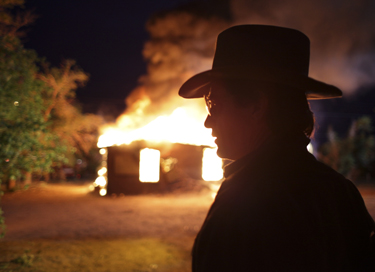 The Rambler (Calvin Lee Reeder, 97m) — For those of us familiar with the grainy-ass-experimental-celluloid ambushes of Calvin Lee Reeder’s previous work, his feature-length version of The Rambler might initially feel like a shock to the system. But that’s what makes it so awesome. Though Reeder shoots his film like a more traditional, “normal” indie movie, this thing is actually the screaming opposite of that. Truth be told, I feel like I need another viewing before writing more clearly about it, but on a first viewing, I interpreted The Rambler as a study in warped guilt, in which Dermot Mulroney’s just-released-from-prison character is actually imagining the presence of The Girl (Lindsay Pulsipher) that he loved and lost—or killed?—way back when. Yeah, I really need to see this one again.
The Rambler (Calvin Lee Reeder, 97m) — For those of us familiar with the grainy-ass-experimental-celluloid ambushes of Calvin Lee Reeder’s previous work, his feature-length version of The Rambler might initially feel like a shock to the system. But that’s what makes it so awesome. Though Reeder shoots his film like a more traditional, “normal” indie movie, this thing is actually the screaming opposite of that. Truth be told, I feel like I need another viewing before writing more clearly about it, but on a first viewing, I interpreted The Rambler as a study in warped guilt, in which Dermot Mulroney’s just-released-from-prison character is actually imagining the presence of The Girl (Lindsay Pulsipher) that he loved and lost—or killed?—way back when. Yeah, I really need to see this one again.
 These Birds Walk (Omar Mullick and Bassam Tariq, 77m) — A striking work of poetic realism, Omar Mullick and Bassam Tariq’s documentary take us inside the walls of the Edhi Foundation in Pakistan. Founded by humanist Abdul Sattar Edhi, we first meet this patient old man before the filmmakers turn their attention to the children he has made it his business to protect. Many of them are orphans, and many are runaways, but once we get a glimpse at how they treat each other inside the foundation’s walls, one quickly realizes that for these kids, there’s no safe haven anywhere to be found. Mullick and Tariq eventually focus on Omar, a troubled adolescent who is a fistfight waiting to happen. It’s a credit to the filmmakers that amidst this unrelenting world of hardship, These Birds Walk retains a sense of beauty and at least a flicker of hope.
These Birds Walk (Omar Mullick and Bassam Tariq, 77m) — A striking work of poetic realism, Omar Mullick and Bassam Tariq’s documentary take us inside the walls of the Edhi Foundation in Pakistan. Founded by humanist Abdul Sattar Edhi, we first meet this patient old man before the filmmakers turn their attention to the children he has made it his business to protect. Many of them are orphans, and many are runaways, but once we get a glimpse at how they treat each other inside the foundation’s walls, one quickly realizes that for these kids, there’s no safe haven anywhere to be found. Mullick and Tariq eventually focus on Omar, a troubled adolescent who is a fistfight waiting to happen. It’s a credit to the filmmakers that amidst this unrelenting world of hardship, These Birds Walk retains a sense of beauty and at least a flicker of hope.
 We Always Lie To Strangers (AJ Schnack and David Wilson, 109m) — AJ Schnack and David Wilson earned a well-deserved Special Jury Prize in Directing for their years-in-the-making slice-of-pie portrait of the individuals who live and work in the bizarre American tourist town of Branson, Missouri. Calling Branson bizarre is a bit of an understatement, which is exactly why Schnack and Wilson received directorial recognition at the SXSW awards, for they manage to maintain a consistently mature tone throughout, even as their camera veers into many wildly divergent directions. We Always Lie To Strangers isn’t just a celebration of Branson; it’s a heartfelt love letter to the American Midwest, a place where we can sense at every moment these filmmakers themselves are from.
We Always Lie To Strangers (AJ Schnack and David Wilson, 109m) — AJ Schnack and David Wilson earned a well-deserved Special Jury Prize in Directing for their years-in-the-making slice-of-pie portrait of the individuals who live and work in the bizarre American tourist town of Branson, Missouri. Calling Branson bizarre is a bit of an understatement, which is exactly why Schnack and Wilson received directorial recognition at the SXSW awards, for they manage to maintain a consistently mature tone throughout, even as their camera veers into many wildly divergent directions. We Always Lie To Strangers isn’t just a celebration of Branson; it’s a heartfelt love letter to the American Midwest, a place where we can sense at every moment these filmmakers themselves are from.
 White Reindeer (Zach Clark, 82m) — One Christmas Eve, Douglas Sirk and John Waters met up in a Delmarva titty bar, where they got tanked and wrote a screenplay. Okay, that didn’t really happen, but watching Zach Clark’s White Reindeer, you might think otherwise. Suzanne (the consistently excellent Anna Margaret Hollyman) is a Northern Virginia wife whose life spirals out of control when her husband leaves her behind and a coworker of reveals a shocking secret. This turn of events sends Suzanne into an unexpected candy-cane spiral of debauchery. Clark’s contribution to the Christmas movie canon is equal parts shocking, hilarious, and genuinely sad.
White Reindeer (Zach Clark, 82m) — One Christmas Eve, Douglas Sirk and John Waters met up in a Delmarva titty bar, where they got tanked and wrote a screenplay. Okay, that didn’t really happen, but watching Zach Clark’s White Reindeer, you might think otherwise. Suzanne (the consistently excellent Anna Margaret Hollyman) is a Northern Virginia wife whose life spirals out of control when her husband leaves her behind and a coworker of reveals a shocking secret. This turn of events sends Suzanne into an unexpected candy-cane spiral of debauchery. Clark’s contribution to the Christmas movie canon is equal parts shocking, hilarious, and genuinely sad.
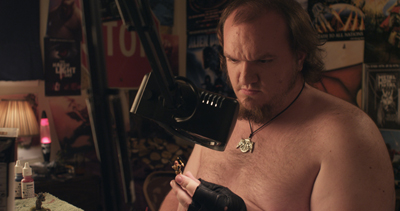 Zero Charisma (Katie Graham and Andrew Matthews, 86m) — This might actually be my favorite narrative world premiere of this year’s festival, and not just because I was—full confession here, shameful, I know—actively expecting not to like it. A “comedy” about a D&D obsessed overgrown man-child who still lives at home with his grandmother? Err, no thanks! Yet from the very beginning, I was hooked. The reasons for my appreciation of this film extend across the board, but without question the primary reason for its success is the (dare I say towering?) performance of Sam Eidson, who, in a just universe, would receive a Spirit Award nomination for Best Actor. Directors Katie Graham and Andrew Matthews fashion a wholly convincing world that at the same time feels tweaked into gonzo-mode. If this film doesn’t land even somewhat decent distribution based on the fact that it doesn’t feature any “names,” I will be very, very disappointed.
Zero Charisma (Katie Graham and Andrew Matthews, 86m) — This might actually be my favorite narrative world premiere of this year’s festival, and not just because I was—full confession here, shameful, I know—actively expecting not to like it. A “comedy” about a D&D obsessed overgrown man-child who still lives at home with his grandmother? Err, no thanks! Yet from the very beginning, I was hooked. The reasons for my appreciation of this film extend across the board, but without question the primary reason for its success is the (dare I say towering?) performance of Sam Eidson, who, in a just universe, would receive a Spirit Award nomination for Best Actor. Directors Katie Graham and Andrew Matthews fashion a wholly convincing world that at the same time feels tweaked into gonzo-mode. If this film doesn’t land even somewhat decent distribution based on the fact that it doesn’t feature any “names,” I will be very, very disappointed.
FILMS WATCHED AND DUG A DARN GOOD BIT
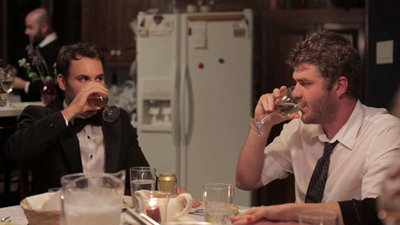 Awful Nice (Todd Sklar, 88m) — Todd Sklar’s brand of humor will certainly not be for everyone, but I found his Duplassian tale of rival brothers reconnecting (in Branson, no less!) to be consistently, genuinely funny. Just one example: “You totally overestimate the collectibles market.” “Dude, shit is worth a lot of money, dude.” “No, it’s not. It’s really not.” A low-budget charmer, Awful Nice has the façade of a Hollywood comedy, but it digs deeper—and is funnier—than most of them.
Awful Nice (Todd Sklar, 88m) — Todd Sklar’s brand of humor will certainly not be for everyone, but I found his Duplassian tale of rival brothers reconnecting (in Branson, no less!) to be consistently, genuinely funny. Just one example: “You totally overestimate the collectibles market.” “Dude, shit is worth a lot of money, dude.” “No, it’s not. It’s really not.” A low-budget charmer, Awful Nice has the façade of a Hollywood comedy, but it digs deeper—and is funnier—than most of them.
 Before You Know It (PJ Raval, 110m) — Oh, lord. Oh, man. If the screen has ever produced a more heart-crushingly sad figure than Dennis Creamer, please don’t let me meet him or her. By focusing on only three aging men existing in very different environments, Raval nonetheless manages to cover a wide breadth of the gay spectrum. Ultimately, what makes Before You Know It so special is that by taking his time letting us get to know these gay men in particular, Raval helps us to see that they are human beings, first and foremost. While it seems like this is the type of film that will be a grand-slam on the LGBT fest circuit, I actually think it would serve a much grander purpose if it made the rounds in sheltered, bigoted communities throughout small town America (churches, mess halls, etc.).
Before You Know It (PJ Raval, 110m) — Oh, lord. Oh, man. If the screen has ever produced a more heart-crushingly sad figure than Dennis Creamer, please don’t let me meet him or her. By focusing on only three aging men existing in very different environments, Raval nonetheless manages to cover a wide breadth of the gay spectrum. Ultimately, what makes Before You Know It so special is that by taking his time letting us get to know these gay men in particular, Raval helps us to see that they are human beings, first and foremost. While it seems like this is the type of film that will be a grand-slam on the LGBT fest circuit, I actually think it would serve a much grander purpose if it made the rounds in sheltered, bigoted communities throughout small town America (churches, mess halls, etc.).
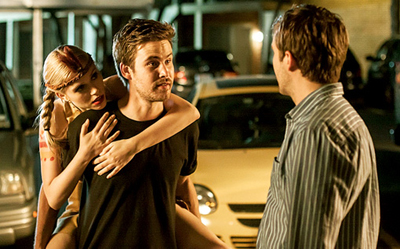 The Bounceback (Bryan Poyser, 92m) — For most out-of-town attendees at SXSW, the goal is to escape the 6th St. shitstorm, whereas much of Bryan Poyser’s The Bounceback takes place inside the 6th St. shitstorm. Making a movie about characters that go bar-hopping on 6th St. seems like a risky proposition, but fortunately, Poyser has assembled an assured group of actors to bring his seriously R-rated comedy to likeable life. Considering the source material, that is an especially difficult thing to have pulled off.
The Bounceback (Bryan Poyser, 92m) — For most out-of-town attendees at SXSW, the goal is to escape the 6th St. shitstorm, whereas much of Bryan Poyser’s The Bounceback takes place inside the 6th St. shitstorm. Making a movie about characters that go bar-hopping on 6th St. seems like a risky proposition, but fortunately, Poyser has assembled an assured group of actors to bring his seriously R-rated comedy to likeable life. Considering the source material, that is an especially difficult thing to have pulled off.
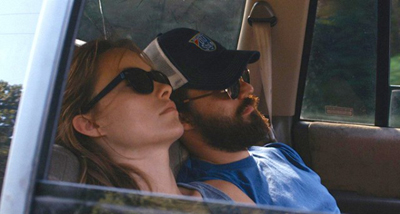 Drinking Buddies (Joe Swanberg, 90m) — In sharp contrast to his navel-fellating videography of the past decade, with Drinking Buddies, Joe Swanberg proves to the world that he knows how to make a bona fide movie. Midway through this superficially familiar naturalistic rom-com, which charts the flirtatious relationship between the otherwise committed Luke (Jake Johnson) and Kate (Olivia Wilde), it becomes clear that Swanberg has a very important choice to make: is he going to do the expected thing, or is he going to make a decision that movies like this are often too chickenshit to make? Refreshingly, he opts for the latter, producing a conclusion that gets all the way there because it never goes there.
Drinking Buddies (Joe Swanberg, 90m) — In sharp contrast to his navel-fellating videography of the past decade, with Drinking Buddies, Joe Swanberg proves to the world that he knows how to make a bona fide movie. Midway through this superficially familiar naturalistic rom-com, which charts the flirtatious relationship between the otherwise committed Luke (Jake Johnson) and Kate (Olivia Wilde), it becomes clear that Swanberg has a very important choice to make: is he going to do the expected thing, or is he going to make a decision that movies like this are often too chickenshit to make? Refreshingly, he opts for the latter, producing a conclusion that gets all the way there because it never goes there.
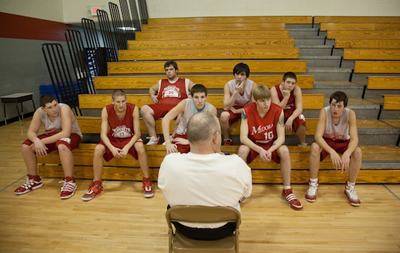 Medora (Andrew Cohn and Davy Rothbart, 82m) — Having not watched a trailer for Andrew Cohn and Davy Rothbart’s documentary, I was expecting a sincere-but-lighthearted portrait of a hapless high school boy’s varsity basketball team (the Medora Hornets), a sort of real life Hoosiers. And though they deliver on that front, Cohn and Rothbart’s film is actually about something much, much heavier. Watching son after son of absent-father after absent-father struggle to come to terms with their less-than-fortunate predicaments makes for a sobering experience.
Medora (Andrew Cohn and Davy Rothbart, 82m) — Having not watched a trailer for Andrew Cohn and Davy Rothbart’s documentary, I was expecting a sincere-but-lighthearted portrait of a hapless high school boy’s varsity basketball team (the Medora Hornets), a sort of real life Hoosiers. And though they deliver on that front, Cohn and Rothbart’s film is actually about something much, much heavier. Watching son after son of absent-father after absent-father struggle to come to terms with their less-than-fortunate predicaments makes for a sobering experience.
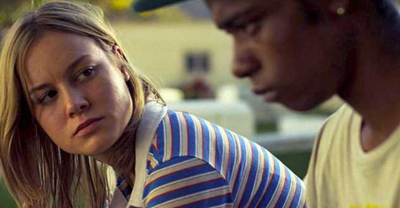 Short Term 12 (Destin Daniel Cretton, 96m) — It’s no wonder that Destin Daniel Cretton’s film took home both the Grand Jury Prize and Audience Award at this year’s fest, for it does just about everything right on its way to the finish line. It sounds like some sort of backhanded compliment/criticism, but I perhaps found it too right on to make me become emotional (soooo many people I spoke to said it made them cry). Yet its heart is in such the right place and the performances are all so strong (especially Brie Larson and Keith Stanfield) that it seems like one can’t not like this movie.
Short Term 12 (Destin Daniel Cretton, 96m) — It’s no wonder that Destin Daniel Cretton’s film took home both the Grand Jury Prize and Audience Award at this year’s fest, for it does just about everything right on its way to the finish line. It sounds like some sort of backhanded compliment/criticism, but I perhaps found it too right on to make me become emotional (soooo many people I spoke to said it made them cry). Yet its heart is in such the right place and the performances are all so strong (especially Brie Larson and Keith Stanfield) that it seems like one can’t not like this movie.
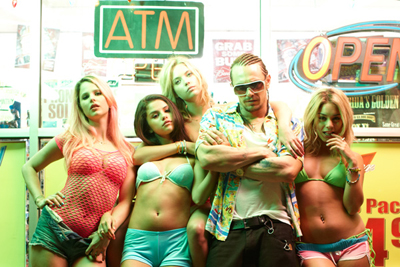 Spring Breakers (Harmony Korine, 92m) —My full review is coming soon (I’ll link to it when that happens), but I will say that the only thing that prevented me from giving in all the way to Harmony Korine’s trashily hypnotic cine-assault is my devotion to the one-and-only The Real Cancun, which I deemed 10 years ago to be the definitive statement on spring break culture and American privilege run amok. Obviously, Korine’s motivations are different here, and there remains so much awesomeness to behold, from the instant classic sequence set to Britney Spears’ “Everytime,” to the epic finale in which the rich, white, privileged tourists literally slaughter the natives and split town, that it’s unfair to make those sorts of comparisons. But still, my feeling walking out of the theater was that I never needed to see it again (perspective: I never feel the urge to attend spring break again either). However, one week later, I’m itching to buy a ticket to watch it with an unsuspecting ‘normal’ crowd when it opens this weekend. I have a strong hunch this is going to be one of the more misunderstood motion pictures of the past many years.
Spring Breakers (Harmony Korine, 92m) —My full review is coming soon (I’ll link to it when that happens), but I will say that the only thing that prevented me from giving in all the way to Harmony Korine’s trashily hypnotic cine-assault is my devotion to the one-and-only The Real Cancun, which I deemed 10 years ago to be the definitive statement on spring break culture and American privilege run amok. Obviously, Korine’s motivations are different here, and there remains so much awesomeness to behold, from the instant classic sequence set to Britney Spears’ “Everytime,” to the epic finale in which the rich, white, privileged tourists literally slaughter the natives and split town, that it’s unfair to make those sorts of comparisons. But still, my feeling walking out of the theater was that I never needed to see it again (perspective: I never feel the urge to attend spring break again either). However, one week later, I’m itching to buy a ticket to watch it with an unsuspecting ‘normal’ crowd when it opens this weekend. I have a strong hunch this is going to be one of the more misunderstood motion pictures of the past many years.
OTHER FILMS I SAW AND DUG TO SOME DEGREE, BUT MY TIME FOR TYPING WORDS ASIDE FROM LISTING THEIR BASIC INFORMATION HAS RUN OUT
Cheap Thrills (E.I. Katz, 85m)
Coldwater (Vincent Grashaw, 104m)
Euphonia (Danny Madden, 53m)
Kiss Of The Damned (Xan Cassavetes, 97m)
LASTLY, THERE WAS SO MUCH I DIDN’T GET TO SEE, BOO HOO, SHAME ON MEEEEE, ETC……










Pingback: SXSW ’13: MIKE S. RYAN’S WRAP-UP – Hammer to Nail
Pingback: SARASOTA FILM FESTIVAL ’13: JURY DUTY – Hammer to Nail